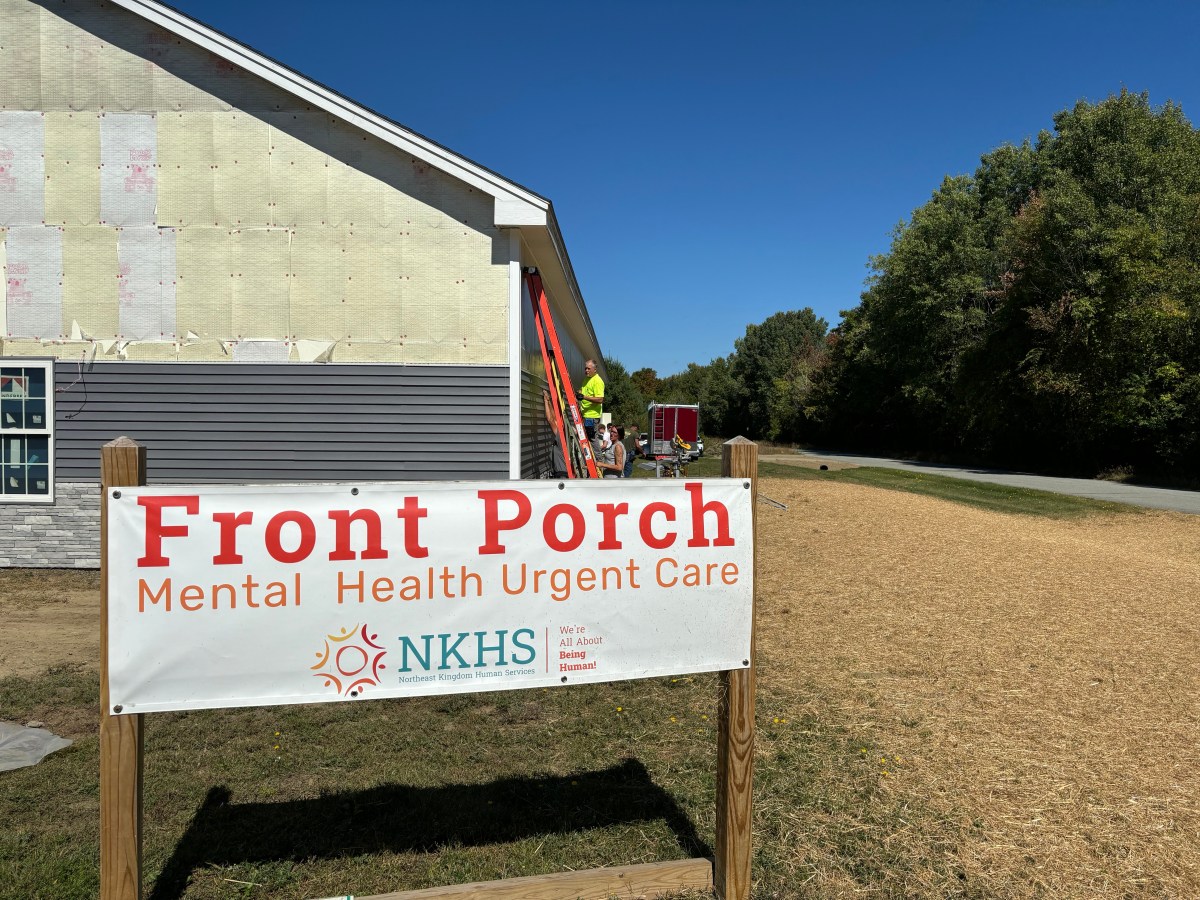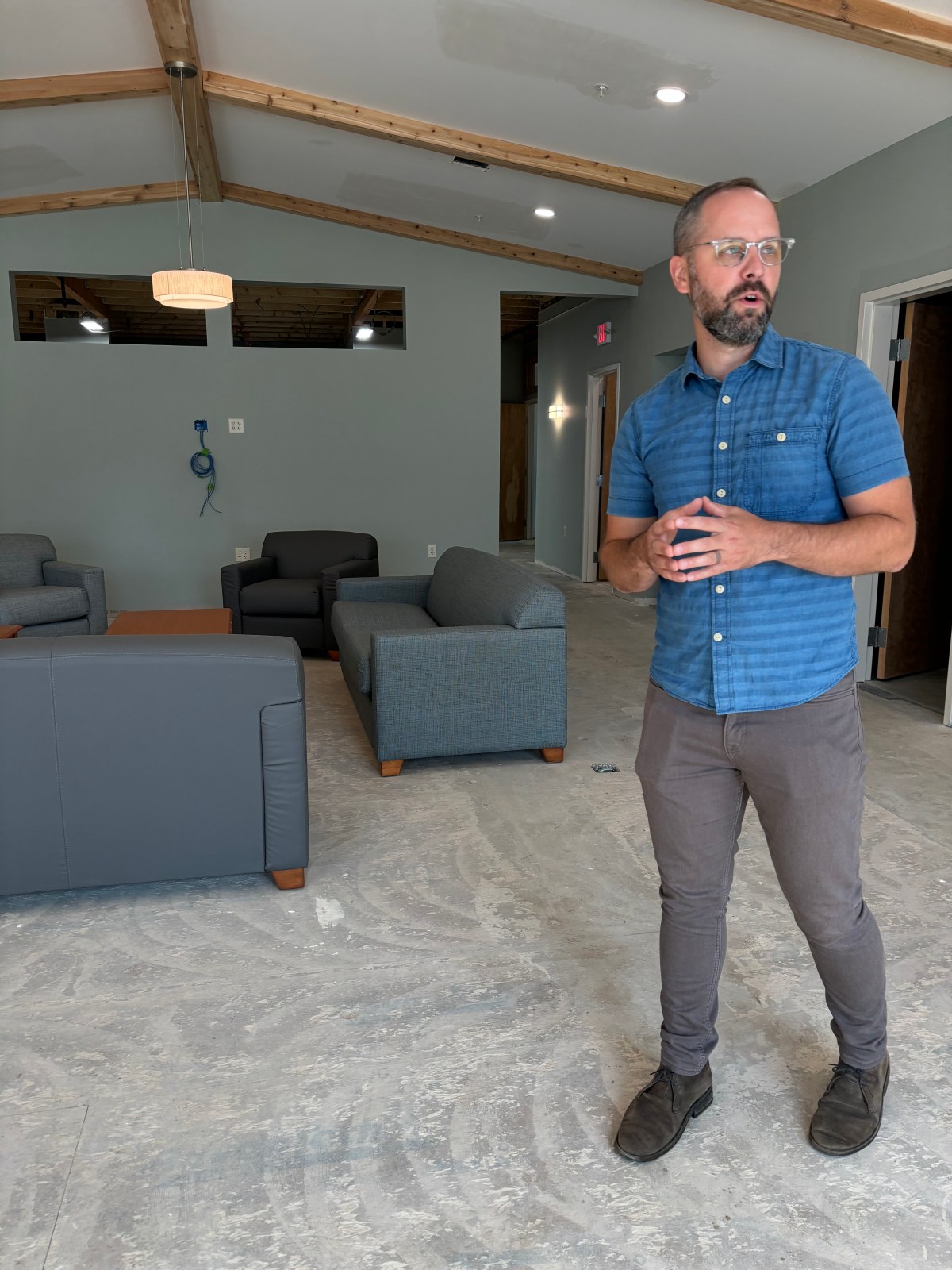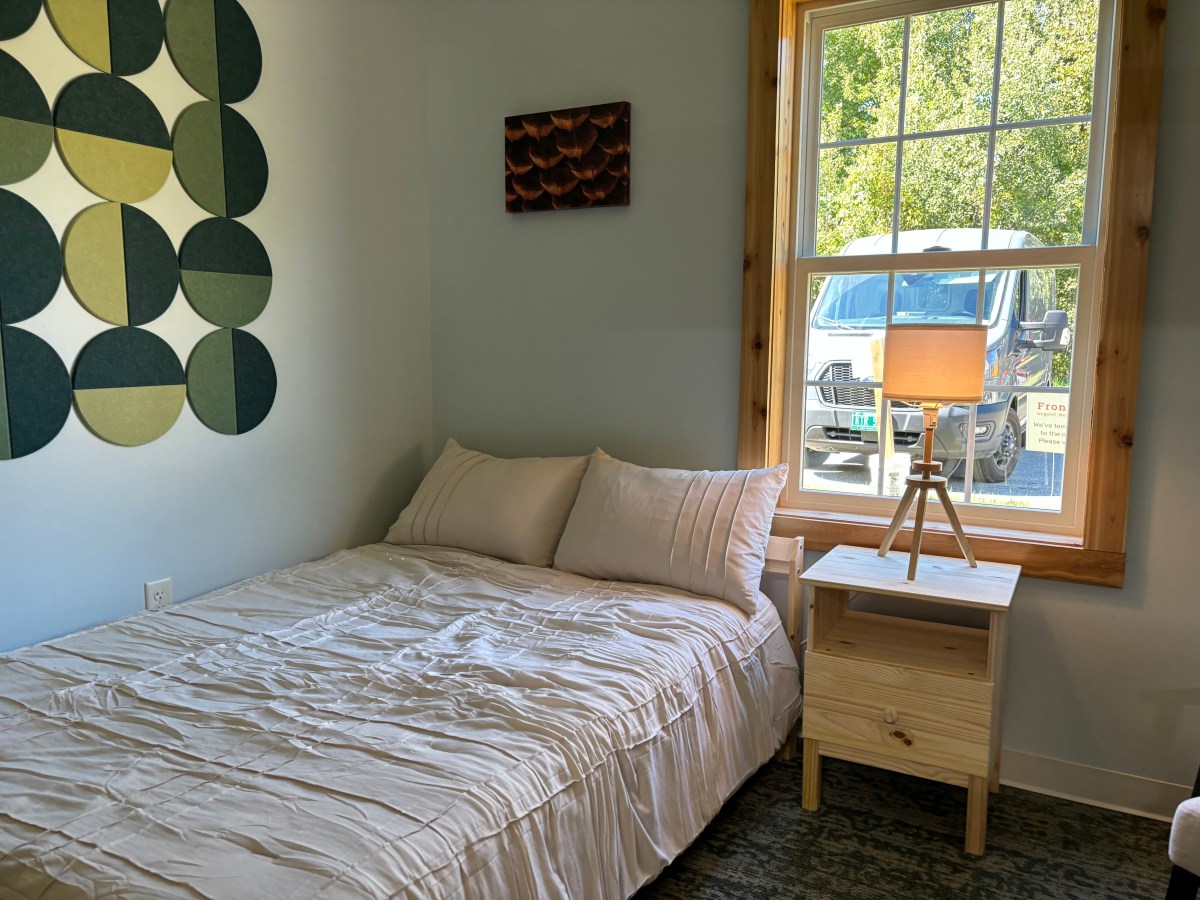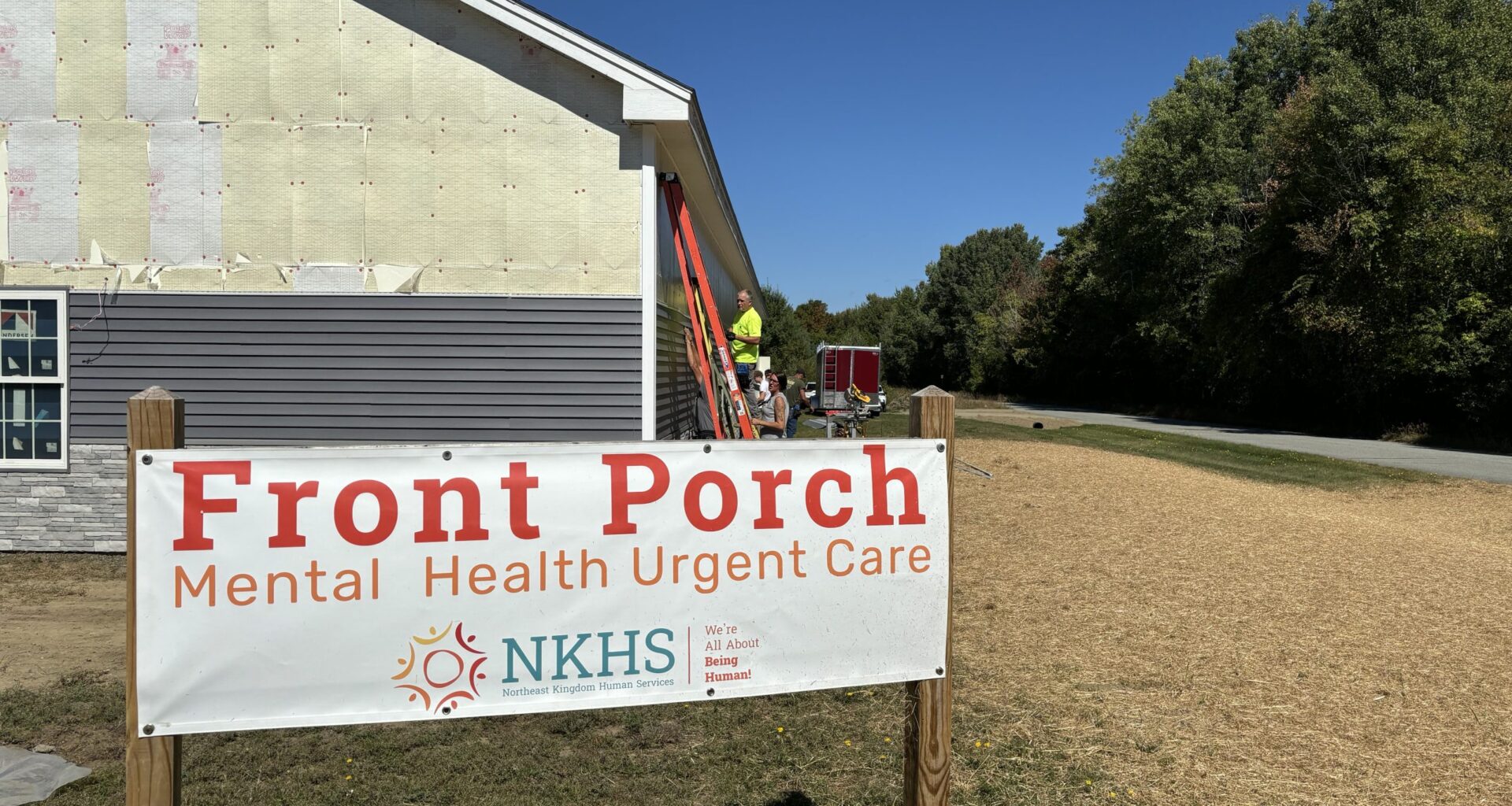 After months of renovation, Newport-based Front Porch will open its overnight beds on Wednesday. Photo by Olivia Gieger/VTDigger
After months of renovation, Newport-based Front Porch will open its overnight beds on Wednesday. Photo by Olivia Gieger/VTDigger
The next phase in a yearslong effort to expand access to emergency mental health care in the Northeast Kingdom begins Wednesday: The Newport-based mental health urgent care Front Porch plans to open four overnight beds after months of construction.
Several mental health agencies across the state staff 24/7 crisis phone lines and offer daytime walk-in urgent care options. But when the Lakemont Road facility opened in Newport City in June 2024, Front Porch became the state’s first — and only — around-the-clock walk-in mental health urgent care program.
However, until this week, people who arrived at Front Porch for help could only stay for 23 hours and 59 minutes because the facility was not set up nor licensed as an overnight option. With the new beds, people can come and go for up to 10 days — no hospital admission or doctor’s referral required.
The space is meant to be a landing place for people navigating a mental health crisis, large or small, without needing to rely on a hospital’s emergency room or 911.
“You can come here. You can stay here, in your community,” said Kelsey Stavseth, the executive director of Northeast Kingdom Human Services, the organization that runs Front Porch. “It’s about stabilizing in your community, so you don’t need to leave. You don’t have to go inpatient. It’s really tailor made for folks who are struggling with mental health needs.”
For the staff at the Vermont Department of Mental Health or the designated private nonprofit organizations the state works with — including Northeast Kingdom Human Services — the phrase “continuum of care” has become a mantra. The oft-echoed guiding principle is to create “someone to call, someone who can come to you, and somewhere to go.”
Front Porch fits into that continuum alongside the 988 suicide text and call lifeline and the state’s mobile crisis response, a coordinated county-by-county response effort that provides a team of clinical professionals to meet patients wherever they may need assistance with mental health or substance use crises.
To get the Front Porch off the ground, Northeast Kingdom Human Services benefited from state grant funding, awarded after the Covid-19 pandemic drove steep demand for increased inpatient psychiatric services as well as more community-based mental health urgent care.
The costs of acquiring the land and originally building the space came to $1.3 million, which Erica Perkins, the organization’s director of communications, confirmed. The renovations alone cost $1.9 million — all of it was covered by $2 million in state funding, plus a million dollar contribution from Northeast Kingdom Human Services’ reserves, Perkins said.
Prior to Front Porch opening last year, people in the Newport area had nowhere else to look for crisis support than over-burdened hospital emergency departments. Across the state, more than $3 million has been awarded since 2023 to programs that offer an alternative to the emergency department, including Front Porch. Since then, Front Porch has also received allocations from the state’s General Fund.
In addition to Front Porch, the state has seven other emergency department alternatives. Adults can access this care through Interlude, run by Counseling Service of Addison County in Middlebury; the Access Hub in Montpelier; and the Howard Center’s Mental Health Urgent Care in Burlington. The Burlington Police Department also has run a Crisis Assessment, Response, and Engagement Services team, though that program will end in December. For children, services reside at the Bennington-based Psychiatric Urgent Care for Kids, Morristown’s Emergent Psychiatric Intervention for Children and the Youth Stabilization Program in Brattleboro.
 Josh Burke, the director of emergency services at Northeast Kingdom Human Services, shows off the communal spaces in a still-under-construction Front Porch during a September visit. Photo by Olivia Gieger/VTDigger
Josh Burke, the director of emergency services at Northeast Kingdom Human Services, shows off the communal spaces in a still-under-construction Front Porch during a September visit. Photo by Olivia Gieger/VTDigger
In the Northeast Kingdom, this entire continuum has yielded especially positive results, according to Stavseth. After leaving Front Porch, 96% of people return to the community, he said. Including outcomes for people who seek help through the crisis line and mobile support team, that number is between 85% and 90%.
Stavseth said he hopes that extending the amount of time people are able to stay will help them build more resilience to tackle mental health challenges beyond Front Porch’s walls. It is important, he added, that people will be able to do this locally. They can stay at Front Porch overnight and still commute to work, without needing to sacrifice a paycheck for the stability Front Porch provides.
“Having a professional place to go is good, but what’s really going to create the resilience is saying, ‘Do you have a job? Do you have family or natural supports in healthy relationships? Do you feel secure in your housing? How can we enhance and support the things we know build healthy life?” he said.
‘Just show up’
The four bedrooms in the Front Porch are light-filled and cozy. They look more like guest bedrooms than clinical spaces, with pine furniture, big windows and canvas photos of the natural world lining the walls.
“We’re always going to need the hospital, but it’s not always appropriate for people to be in there. It’s not really therapeutically appropriate if you’re going to be there for a long period of time. And so we really want to make it home-like,” Stavseth said.
Above each bedroom’s door sits a window so people can see if the lights are on in the communal space that each room opens onto. It is supposed to help people gauge whether they want to join people outside of their room, without sacrificing the privacy of a windowless door. When VTDigger visited the space in mid-September, the facility centered around an open kitchen with a collection of tables and chairs and a big living room with vaulted ceilings lined with more pine beams.
All of it strives to follow a philosophy of nature-guided design that has been shown to bolster well-being and physical health. Along the perimeter are single-stalled bathrooms with white marble tiles and a shower.
The expertise and resources that an individual can access while staying at the renovated Front Porch, are not too different from what was available before. But now, they can access them for longer stretches of continuous time.
The services are accessible to all ages, Stavseth said. He also added that there is no baseline level of severity that people need to meet to come.
“Stress and anxiety can come from a flood. It can come from losing your housing. It can come from losing your job. It can come from raising kids, which we know is difficult and challenging,” he said. “I think people are like, ‘What’s the threshold to come here?’ Really just show up and we’ll figure it out with you.”
When someone arrives at Front Porch, they go through an assessment and screening to determine what support they might need. If the person does have a medical need, Front Porch will connect them to the hospital.
“Anything but that we will support,” Stavseth said. “That can be a wide ranging spectrum, from suicidal ideation to generalized anxiety (or) just to stressors at home that you need a break (from) and you need to talk to somebody about.”
At Front Porch, people can join group therapy sessions or meet individually with a therapist. They can walk through the center’s community garden or living room spaces. They can get a cup of coffee, take a shower and decompress.
Additionally, they can talk to a peer support specialist.
Byron Savoy, who works as one such peer support staffer at Front Porch, described the position as “radically egalitarian.”
“We’re not authorities. We’re not experts,” he said. “I think one of the most significant things that we do is just to listen to people.”
From there, Front Porch’s staff can help connect people with other, more directed services, like ways to access food, support for finding housing, substance use help or specific mental health counseling.
Often, though, the act of having a peer listen and talk can be profound: “Some of the stigma attached to mental health is bridged by people saying ‘I’ve gone through the same thing. Let’s just chat.’ This isn’t about assessing you or diagnosing you. It’s about supporting you through a challenging situation,” Stavseth said.
 The space aims to incorporate lots of natural light and ‘biophilic design’ which has been shown to lower stress and boost physical health. Photo by Olivia Gieger/VTDigger
The space aims to incorporate lots of natural light and ‘biophilic design’ which has been shown to lower stress and boost physical health. Photo by Olivia Gieger/VTDigger
Firehouse model
For now, all of the services at Front Porch are free.
Eventually, they would like to be able to bill insurers for the services they provide — which are less costly and demanding on the overall health system than someone occupying a bed in an emergency room.
But doing so will take time for the center to sustain itself on a fee-for-service model.
“Crisis services need to be funded from a capacity mindset, not like a fee-for-service,” Savseth said, citing the importance of being open all day, every day. “They call it a firehouse model. You want enough fire(fighters) around to go to fires, but if they had to be funded on how many fires they put out, then you’d be wishing for more fires.”
Starting this week, Stavseth said, staff at Front Porch are ready to put out whatever fires people bring to their doorstep. They are now prepared to respond, whether the process takes hours or days.

